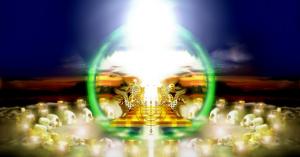 Matthew 24:1-14
Matthew 24:1-14
Sometimes, a man’s got to do what a man’s got to do. In this case, I feel compelled to say a word about Matthew 24 and its relationship to eschatology. In a word, I believe that in Matthew 24, Jesus is speaking not about the end of the world before His Second Coming but about events that would transpire in the 1st century.
Let me offer a few points of evidence. First, when Jesus proclaims His woes upon the scribes and Pharisees, saying that they will kill the prophets He sends, He concludes by saying, “Assuredly, I say to you, all these things will come upon this generation” (Matthew 23:36). Without getting into arguments about the Greek word for “generation,” it’s abundantly clear that Jesus is talking to the actual scribes and Pharisees that He’s just pronounced the woes upon. They will persecute Jesus’ messengers, and He says to them that all these things will come upon this generation.
Second, it’s in response to Jesus saying that the Temple will be destroyed that the disciples ask when these things will be and what will be the sign of His coming (24:1-3). They’re asking not about the end of all time but about the events leading to the destruction of the Temple.
Third, when the disciples ask Jesus what will be the sign of His coming, they can’t mean His Second Coming: they have no idea there will be a Second Coming because Jesus hasn’t left yet. They’re not even sure at this point that He has to die. The Greek word for Jesus’ “coming” here is parousia, a word that was used for a state visit in the Roman Empire or for a dramatic event such as a miracle which revealed the power and presence of a god. It is in these senses that Jesus would come to destroy the Temple.
Finally, when Jesus talks about not being deceived and about being killed, He’s talking directly to His disciples who are right there with Him.
It might seem as if I’m putting a damper on things and that I’m killing the eschatological party. Sorry, there’s no Rapture anywhere in this passage. It’s true that I am taking our eyes off of what will happen when at the end of all time right before the Second Coming. But that’s not a bad thing. The truth is, we know very little about this and any speculation we might enjoy doesn’t really have a lot to do with what God has asked us to do in this life.
Far from diminishing life in the Kingdom of Heaven, I hope that by putting this passage in perspective I may magnify it so that we can see it for the exciting adventure and eternal joy that it is. What all of this means to us is that we already live in the New Age because the New Covenant with its new King, new High Priest, new Temple, new Sacrifice, and new Life have already come. The destruction of the Old was an earth-quaking, heaven-shaking event. As we Christians know, the coming of Christ, not only in His birth but also in His life, His death, His Resurrection, His Ascension, His coming in A.D. 70 and His presence among us for 2000 years has absolutely changed the world.
But since the Kingdom of Heaven is not here in all of its glory, the Kingdom of Man remains. For this reason, we should not be surprised that Jesus’ words to His disciples of the 1st century sound fresh to His disciples in the 21st century. Nation still rises against nation, and I suppose they will until the end of time and all is made right. Christians still experience tribulation, and those of us in the U.S. who have been spared thus far should read more about the tribulation of Christians across the world, knowing that one day such things may happen here as well. Pay attention to the hate crime laws in Europe and Canada, as just one example, and remember that your children may one day live in a U.S. where persecution of Christians is possible. False prophets are still with us and still deceive many. Lawlessness still abounds, and the love of many has grown cold.
A strange thing happened to me when I was studying for my Ph.D. in Religious Studies. I was studying the identity of contemporary orthodox Anglicanism and broke through something similar to the sound barrier. Previously, though I had been an Anglican since 1988, I had thought of Anglicanism in terms of the various textbooks and introductions to Anglicanism that I’d read. When most of us learn history, we get a very smoothed out, gutless, lifeless history. It’s why we think we don’t like history, and it’s why history looks so different from the textbooks when you look up close.
What I discovered is that there really was no golden age of Anglicanism, and that, furthermore, there was no golden age of Christianity. The truth is that if you were to look at the age of the apostles, the age of the Ecumenical Councils, the age of the Reformation, or any age you cared to look at that things in Christianity would be messy and ugly. In every age you would find persecution and heresy, apostasy and wolves in sheep’s clothing, lawlessness and love grown cold. But in every age you would also find saints and martyrs, heroic leaders and courageous teachers, and love reborn and sacrificially given by Christians to their neighbors.
This is what I see in contemporary America. I see a period of almost 50 years of moral decline: the things we tolerate today would have been unimaginable 50 years ago. The things that Christian parents let their children watch and hear and do would have been unimaginable 50 years ago and incomprehensible to most Christians for the past 2000 years. I hear megachurches that peddle self-help therapy instead of the gospel of Jesus Christ, and I see fuzzy-headed syncretists who think that it’s cool to be ambiguous and not have answers and not be your parents’ church. I see mainline churches in decline, and I see a triumphant secularism in every aspect of American public life: education, academia, the media, and politics. I see a nation that might not long endure if present trends continue.
But I also see a church that transcends America and will outlive the 21st century. I see a church that struggles to disentangle itself from its hangover from the Roman Empire and its models of church. I see a gospel of the kingdom that continues to be preached in the U.S. and throughout the world, and I see Christians heroically and joyfully witnessing to the nations. I see a vast army of Christians who will endure to the end and shall be saved.
Most of all, I see the Son of Man sitting at the right hand of the Father, the King of kings and Lord of lords whose kingdom and throne and scepter cannot be shaken. I see a Christ who has come, has seen, and has conquered. I see my Lord and my God. And that’s right where I want to be!
Prayer: O Lord our governor, we beseech Thee, of Thy mercy,
That we may have the heavenly vision,
And behold things as they seem unto Thee,
That the turmoil of this world may be seen by us
To be bringing forth the sweet peace of the eternal years,
And that in all the troubles and sorrows of our own heart
We may behold good, and so, with quiet mind
An inward peace, careless of outward storm,
We may do the duty of life which brings to us
A quiet heart, ever trusting in Thee.
We give Thee thanks for all Thy mercy.
We beseech Thy forgiveness of all our sins.
We pray Thy guidance in all things,
Thy presence in the hour of death,
Thy glory in the life to come.
Of Thy mercy hear us,
Through Jesus Christ our Lord.
Amen. (George Dawson)
Points for Meditation:
- Do current events worry you? How might seeing Christ in heaven help with worry?
- What are some ways in which the glory of God’s Kingdom is available to you today?
Resolution: I resolve to meditate on Christ in heaven and allow my worship of Him to govern how I see the world today.
© 2014 Fr. Charles Erlandson











